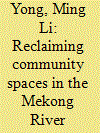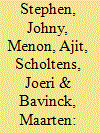|
|
|
Sort Order |
|
|
|
Items / Page
|
|
|
|
|
|
|
| Srl | Item |
| 1 |
ID:
174823


|
|
|
|
|
| Summary/Abstract |
Currently approximately 9 million tons of plastic enter the world's oceans annually. This is a major transboundary problem on a global scale that threatens marine wildlife, coastal ecologies, human health and livelihoods. Our concern in this paper is with the environmental governance of marine plastic pollution that emanates from Thailand, the sixth biggest contributor globally. By zooming in on land‐based polluters in Thailand, we highlight both the systemic nature of the marine plastic problem and the relative impunity with which drivers of transboundary environmental harm function at all levels of governance. Drawing from 19 interviews conducted with actors from the public, private and non‐profit sectors, we examine three stages of the problem: production, consumption and waste management. We found that three major barriers prevent Thailand's government, private sector and citizens from engaging in the sort collective action needed to reduce marine plastic pollution. They are: (i) insufficient incentives to enact political change; (ii) scalar disconnects in waste management; and (iii) inadequate public and private sector ownership over plastic waste reduction. As the state alone cannot change corporate and consumer behaviour, we argue that multi‐stakeholder efforts across organisational scales of governance and administrative boundaries are needed to address the barriers.
|
|
|
|
|
|
|
|
|
|
|
|
|
|
|
|
| 2 |
ID:
174811


|
|
|
|
|
| Summary/Abstract |
In Northern Thailand's Chiang Khong district, which lies along the banks of the Mekong River and the Thai‐Lao border, an community‐based environmental movement under the leadership of the Rak Chiang Khong conservation group emerged in response to processes that have appropriated territories traditionally used by locals for state‐led economic exploitation. The Rak Chiang Khong has put up fierce opposition to large‐scale development projects such as the China‐led navigation project, which planned to blast ecologically and culturally significant rapids, and hydropower dam development along the Mekong River. As a result, local‐level governance arrangements of the transboundary commons in Chiang Khong have shifted to counter threats both within and beyond the borders of Thailand. Through adapting fishing arrangements, engaging in community‐led research and establishing village conservation zones, overlapping forms of territorialisation have emerged in response to socio‐ecological changes to the river. These new forms of territorialisation are produced by complex configurations of political, cultural, and ecological histories, politicaleconomic changes, and transboundary dynamics. These territorial strategies have been key towards reclaiming the transboundary commons of the Mekong River for riparian communities, and providing a deeper understanding of the values that drive community involvement in the transboundary environmental governance of the Mekong River.
|
|
|
|
|
|
|
|
|
|
|
|
|
|
|
|
| 3 |
ID:
120216


|
|
|
|
|
| Publication |
2013.
|
| Summary/Abstract |
This article examines how the politics of scale affect a process of dialogue led by civil society actors over fishing conflicts taking place at the local level in South Asia. The location is the Palk Bay and the fishers are Tamils from India and Sri Lanka. An agreement over fishing rights reached between these fishers in August 2010 remains largely unimplemented, but takes centre stage for this article, which examines the negotiation processes in terms of politics of scale and highlights the various difficulties encountered. Major pitfalls in a dialogue of this sort are the failure to recognise diversity within the population(s) involved and lack of recognition of the linkages of this population with other actors at different scales or levels. In a transboundary context, national and regional identities at times override local identity and interests, thereby making locally constructed solutions difficult, if not impossible, to implement.
|
|
|
|
|
|
|
|
|
|
|
|
|
|
|
|
| 4 |
ID:
174820


|
|
|
|
|
| Summary/Abstract |
This paper focuses on the ‘the unseen transboundary commons’ of residues, nutrients and mobile matter associated with the annual flood pulse that support Cambodia's inland fisheries. We develop the idea of biophysical geopolitics concentrating on political‐socio‐natures rather than the purely biophysical. In the context of multiple mega‐projects in the Basin, we argue the flood pulse has become increasingly compromised, which is an urgent socio‐ecological security issue facing the Mekong region. Scores of livelihoods are dependent on the hydrological flood pulse via the reproduction of the inland fisheries, and a diversity of wetlands resources. Our paper builds on cross‐comparative research focusing on a geo‐strategic mouth of the Tonle Sap (Chhnok Tru) and a transborder area along the Mekong main‐stream (Stung Treng, Cambodia – Champasak, Laos area). By viewing biophysical matter as becoming trans‐border geopolitical matter, we wish to emphasise the critical socio‐ecological character of the hydrological flood pulse, and the urgency of cumulative spatial and temporal changes affecting diverse wetlands communities. Loss of wild capture fisheries and the more unpredictable flows of the Mekong are signs of an emergent and dangerous era of increasing environmental insecurity.
|
|
|
|
|
|
|
|
|
|
|
|
|
|
|
|
|
|
|
|
|